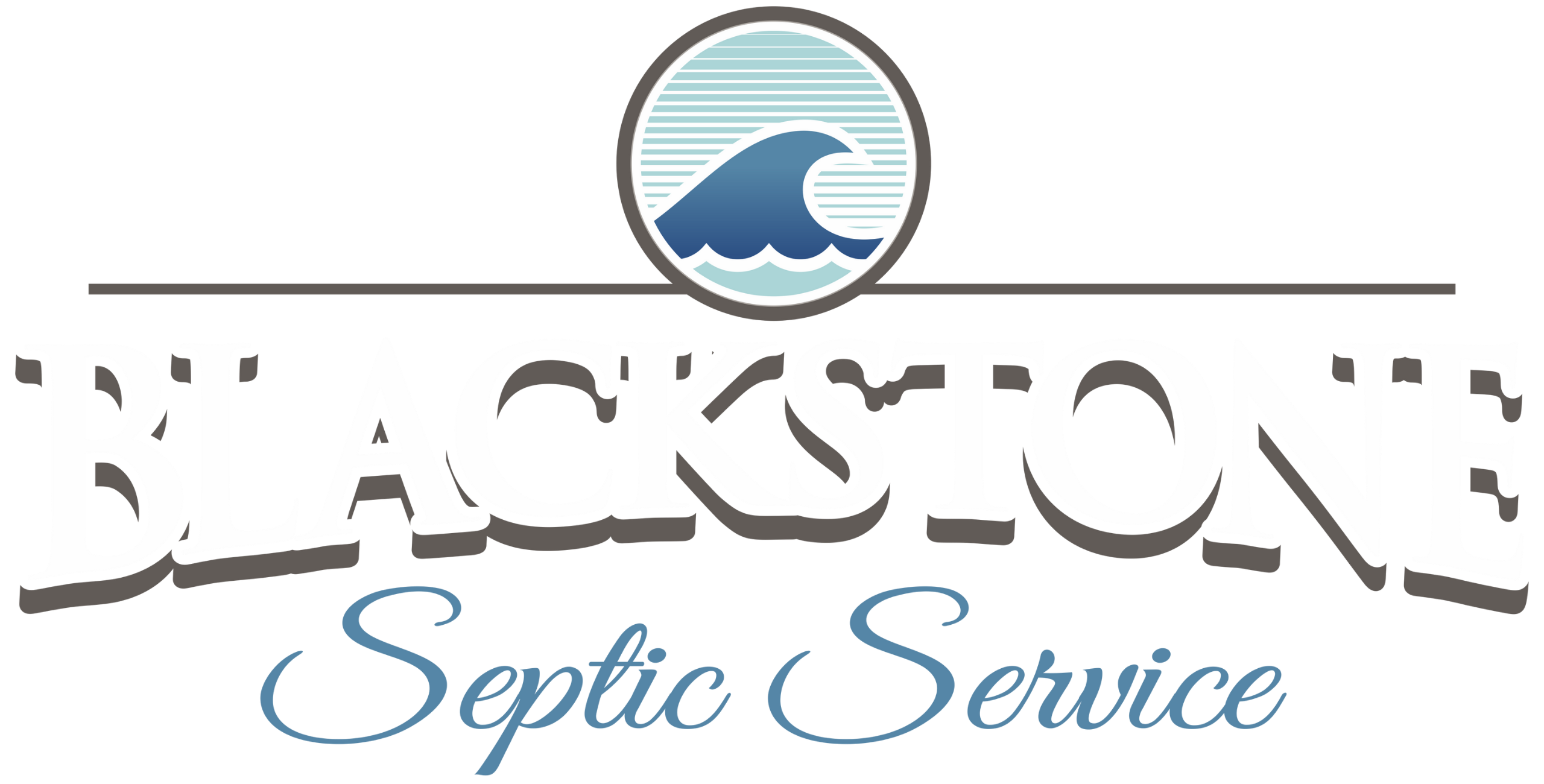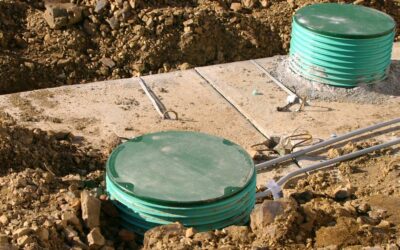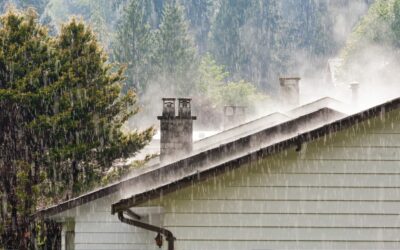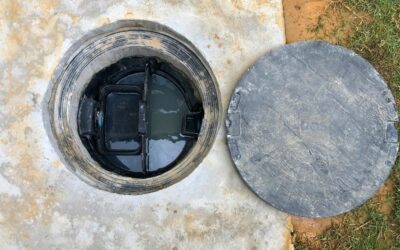Parking your vehicle in your driveway or yard seems harmless, right? But what if your septic system is buried beneath?
Have you ever asked, ‘Can you drive over a septic tank’? The answer might surprise you.
Driving or parking over your septic tank can lead to potential severe damage and even a septic tank collapse. It’s not just about heavy trucks and large vehicles; even light vehicles like a Mini Cooper, an ATV, or a golf cart are equally risky. Additionally, wet ground conditions further exacerbate the situation.
To answer the question ‘Can you drive over a septic tank’ is a firm no.
But with a little knowledge and vigilant care, you can ensure the longevity of your septic system and avoid the costly and smelly problems that come with a damaged tank.
Ultimately, you should avoid driving a vehiicle onto the septic tank and the surrounding area of it.
Why You Should Avoid Driving Over a Septic Tank:
- Driving or parking on a septic tank can cause severe system damage.
- All vehicles, regardless of size or weight, pose a risk.
- Wet conditions amplify the risk of damage.
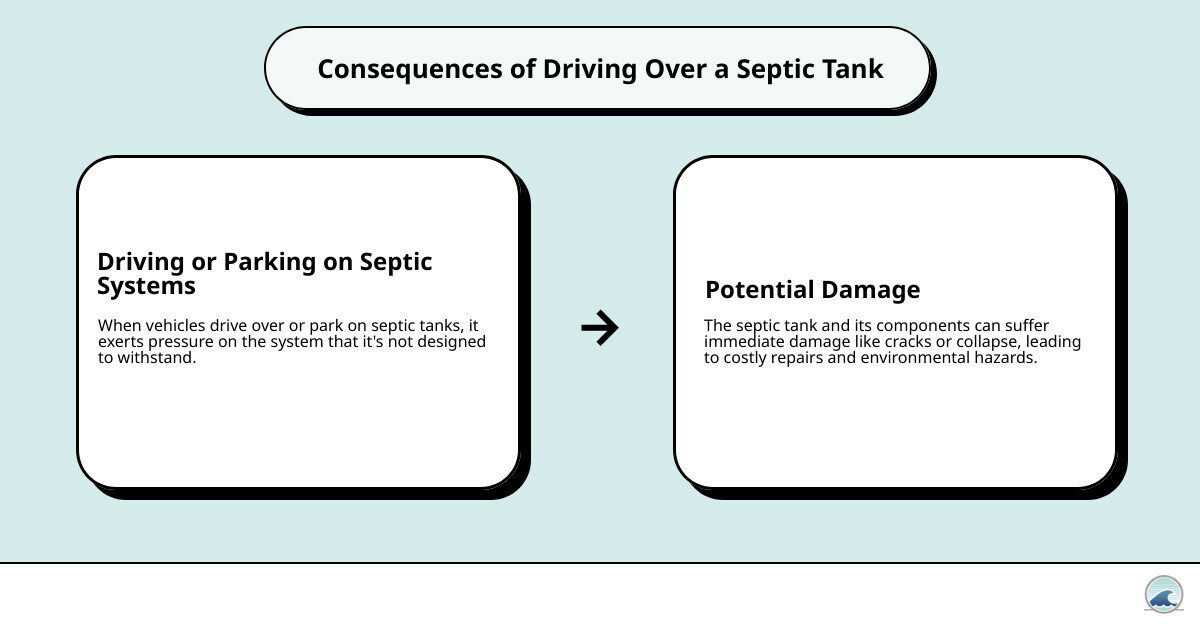
As your reliable and local partners with over 75 years of experience in comprehensive septic services, we at Blackstone Septic Service are dedicated to helping homeowners understand and properly care for their septic systems.
Table of Contents
Now, let’s dive into the importance of understanding your septic system!
Understanding Your Septic System
Before we delve into the potential dangers of driving over a septic system, understand what a septic system is and how it functions.
What is a Septic System and How Does it Work?
A septic system is a self-contained, underground wastewater treatment setup. It’s primarily used in areas where centralized sewer systems are not available, such as rural and semi-urban settings.
The system treats and disposes of household wastewater on-site.
A typical septic system comprises two major components:
The septic tank and the drain field, also known as the leach field.
- The septic tank receives wastewater from your home, where it separates into three layers – solids or “sludge” at the bottom, a layer of clear water in the middle, and floatables or “scum” at the top.
- Anaerobic bacteria within the tank convert the organic matter in the sewage into a liquid form, further reducing the solids. This treatment process also deactivates some disease-causing germs present in the wastewater.
- The clear water layer then flows into the drain fields for secondary treatment, where it undergoes further filtration and treatment before being safely absorbed by the soil.
In summary, a septic system processes household wastewater through a tank and drain field, converting it to a safe liquid form and environmentally absorbing it into the soil.
The Importance of Knowing Your Septic System’s Location
Now that we’ve explained how a septic system works, it’s crucial to understand the importance of knowing the exact location of your septic tank, leach field, and distribution box. This knowledge can save you from damaging your septic system unintentionally.
How to Protect Your Septic System?
- Septic tanks and leach fields are typically buried just under the surface, anywhere from 16 inches to three feet down, making them susceptible to surface activities.
- Driving or parking heavy vehicles or equipment over them could lead to serious, often costly damage.
In the following sections, we’ll discuss in detail the risks of driving over septic tanks and how you can safely navigate around your septic system.
The Risks of Driving Over Septic Tanks
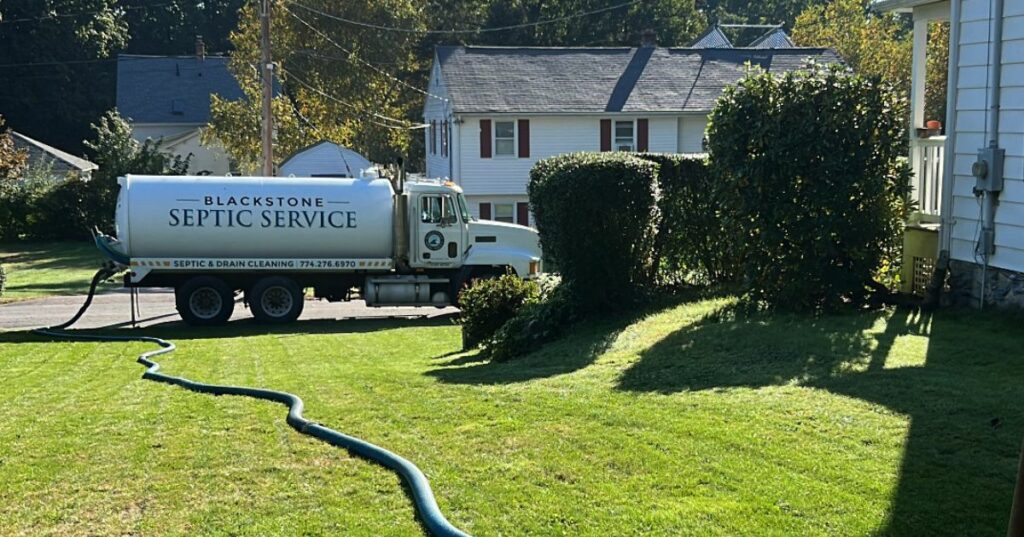
When “out of sight, out of mind” often reigns, it’s easy to forget about your septic tank. However, just because it’s buried doesn’t mean it’s invincible to harm.
Driving over a septic tank or its associated drainage field is not recommended. Septic systems are underground wastewater treatment structures that rely on the natural processes of anaerobic bacteria to break down and treat sewage.
Driving over these components can potentially damage the system and lead to issues such as:
- Soil Compaction: The weight of vehicles can compact the soil above the septic tank and drain field, reducing the soil’s ability to absorb and treat wastewater.
- Structural Damage: Driving over a septic tank can cause physical damage to the tank or its components, leading to leaks or malfunctions.
- Disruption of Drainage: The drain field, also known as leach field or absorption field, is crucial for the proper distribution of treated wastewater into the soil. Driving over it can disrupt the drainage pattern and compromise the effectiveness of the system.
- Risk of Contamination: Damaging the septic system may result in the release of untreated sewage into the surrounding soil, posing a risk of groundwater contamination and environmental hazards.
To avoid potential issues, it’s important to know the location of your septic system and take precautions to prevent damage. Be aware of the layout of your property and avoid driving vehicles or heavy equipment, such as a lawn mower, over the septic tank and drain field areas.
As a septic system specialist, we can’t stress enough the importance of understanding the risks of driving over septic tanks.
Immediate and Long-Term Damage Caused by Driving Over Septic Tanks
Driving over a septic tank might seem harmless, especially if it’s in an out-of-the-way spot in your yard. However, the weight of a car or truck can cause significant damage.
Short and Long-Term Concerns:
- The immediate threat is a potential collapse of the tank. This is not a minor inconvenience but a major catastrophe that can lead to serious damage and costly repairs.
- Even if your tank survives the initial pressure, the weight can cause long-term damage. The constant stress from vehicles can weaken the structure over time, leading to cracks or leaks.
And as we mentioned earlier, a leaky septic tank is not just an inconvenience; it’s a smelly, costly problem that can damage your property and possibly even contaminate your groundwater.
Different Vehicle Weights and Their Impact on Septic Systems
You might assume that only heavy vehicles can cause damage, but that’s a misconception. Light vehicles, like a Mini Cooper or even golf carts and ATVs, can exert undue stress on your septic system and lead to costly repairs.
The key is not the size of the vehicle but the weight it puts on the septic tank.
The Effect of Ground Conditions on the Risk of Damage
Ground conditions also play a significant role in determining the risk of driving over a septic tank.
- Wet conditions can be particularly treacherous.
- When the ground is soaked with moisture, the soil becomes movable.
- A heavy vehicle can easily cause a shift in the ground, leading to serious damage to your septic tank.
This is why it’s important to be extra cautious around your outdoor plumbing when it’s wet, as it becomes more vulnerable to damage.
So next time you’re tempted to drive or park on your septic tank, remember the risks and steer clear.
How to Safely Navigate Around Your Septic System
Knowing where your septic tank is located and how to avoid causing damage to it is vital for homeowners.
The question of ‘can you drive over a septic tank’ should always be answered with a resounding ‘no’.
Here are some practical tips to help you navigate around your septic system safely.
Tips for Preventing Vehicles from Driving or Parking Over Septic Systems
- Mark the Area: Make sure to clearly mark the location of your septic tank in your yard. This can be done with a subtle yet noticeable object, such as a garden ornament, a distinctive plant, or a decorative rock. This will serve as a constant reminder of where to avoid parking or driving.
- Use a Map or Diagram: In addition to a physical marker, create a detailed map or diagram of your septic system’s location and keep it with your household paperwork. This will come in handy when explaining the septic system layout to a professional, or if you need to move heavy objects around your yard.
- Educate Family and Visitors: Make sure everyone in your household, as well as visitors, are aware of the septic tank’s location and the risks associated with driving or parking over it.
Advice on What to do if You Accidentally Drive Over Your Septic Tank
Accidents happen. If you inadvertently drive over your septic tank, don’t panic.
- The first step is to immediately move your vehicle off the septic tank area.
- Then, monitor your septic system closely for any signs of damage.
These could include slow drains, the unpleasant smell of sewage, or water pooling on the ground above your septic tank.
If you notice any of these signs, it’s important to contact a professional septic service company like us at Blackstone Septic Service immediately. We can inspect your septic system and assess whether any damage has occurred.
Guidelines for Moving Heavy Objects, Like Sheds, Near Septic Systems
When it comes to moving heavy objects near your septic system, extreme caution is required.
- Know Your System’s Location: Understand the exact location of your septic tank and drain field to avoid placing heavy objects directly above or near these components.
- Distribute Weight Evenly: When moving heavy objects, distribute the weight evenly to minimize stress on specific areas of the soil and septic components, preventing potential damage.
- Consult Professionals and Follow Regulations: If uncertain about the impact on your septic system, consult with professionals or contractors experienced in working around such systems.
In situations where heavy objects need to be moved and the only access is across your septic tank, we highly recommend hiring professionals to ensure the task is handled safely and efficiently.
In conclusion, the key to safely navigating around your septic system is awareness and prevention. Always be mindful of your septic tank’s location and take steps to minimize the risk of damage.
Legal and Building Considerations
As a homeowner, be aware of the legal and building considerations related to your septic system.
This includes understanding why certain structures, like decks or patios, can’t be built over your septic system, the permits required for buildings near septic systems, and specific regulations in regions like Florida and Texas.
Why You Can’t Build a Deck or Patio Over a Septic System
Building a deck or patio over a septic system might seem like a smart use of space, but it’s actually a risky move.
This is primarily due to the fact that heavy structures like decks or patios can exert undue pressure, similar to how a vehicle might, leading to potential damage.
This is the same reason why driving over a septic tank is generally discouraged.
Furthermore, building a structure over your septic system can make it difficult to access for routine maintenance, inspections, or repairs. This could lead to neglect and ultimately a failing septic system.
Permits Needed for Building Near Septic Systems
Just as you might require permits for building a deck or patio, you’ll also need permits for any construction near a septic system.
When your home was first built, a permit for installing the septic system would have been issued and recorded. Similarly, any new construction around the septic system, like a shed or an extension to the house, would require a permit.
To access these records and apply for new building permits, you can visit your local health department or municipality’s office. These records can provide you with critical details about your septic system, including its location, size, and when it was last pumped.
Specific Considerations for Massachusetts Septic System Regulations
Just like in many other states, Massachusetts has distinct regulations governing septic systems.
In the Bay State, the Department of Environmental Protection (MassDEP) oversees septic system care and enforces specific guidelines for installation and maintenance.
One notable aspect of Massachusetts septic regulations is the consideration given to protecting the state’s water resources.
- The Massachusetts Title 5 septic system regulations, implemented by MassDEP, aim to prevent contamination of groundwater and surface water.
- These regulations outline requirements for system design, construction, and maintenance to safeguard environmental health.
In certain regions of Massachusetts, such as coastal areas or those with high water tables, there may be additional restrictions and requirements for septic systems.
Coastal areas, in particular, are often subject to strict regulations to prevent nutrient runoff and protect sensitive ecosystems.
In conclusion, when dealing with septic systems in Massachusetts, it is imperative to be aware of the legal and environmental considerations.
When to Call a Professional for Septic System Inspection
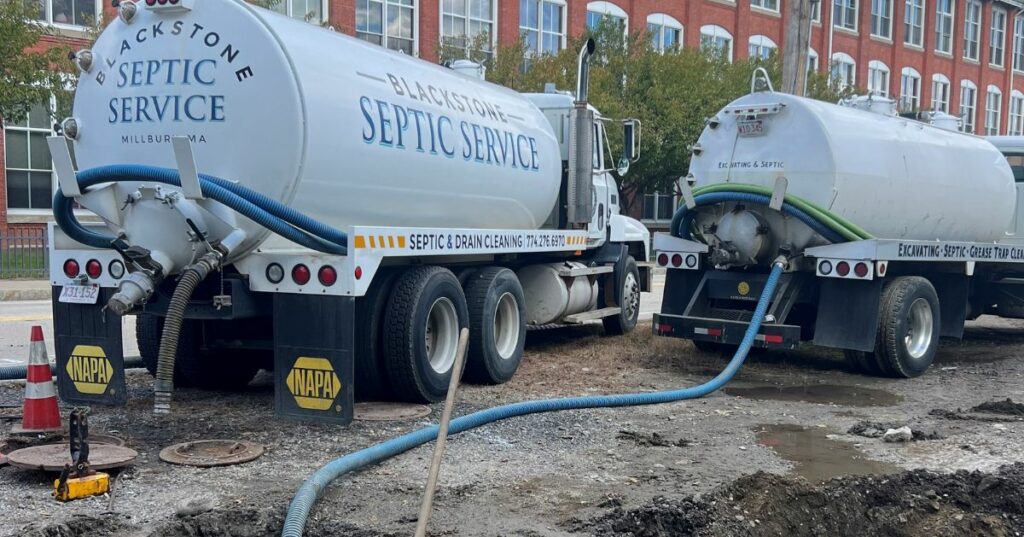
While taking precautions and being aware of your septic system’s location can help prevent damage, sometimes unexpected issues might arise.
As a homeowner, recognize the signs that your septic system may be damaged and when it’s time to call a professional.
Signs That Your Septic System May Be Damaged
It’s crucial to know the warning signs of a full or damaged septic tank. Even if you haven’t driven over your tank, there may be other issues at play.
Some indications to watch out for include:
- Pools of water around the drain field.
- Slow drains or difficulty flushing toilets.
- Water coming out of the system, sewage backup, or gurgling sounds in your pipes.
- Foul odors or unusually healthy grass above the tank.
These symptoms should not be ignored, as they could be signs of a serious issue that could lead to costly repairs and potential health risks.
Introduction to the Services Provided by Blackstone Septic Service
At Blackstone Septic Service, we are always ready to assist you with septic tank maintenance and repair. Our experienced septic tank specialists have carefully reviewed and edited all of the content to ensure that it meets our high standards for quality and accuracy.
Our services encompass everything from routine maintenance like septic tank pumping and sewage backup to new system installations. We are a family-owned company with highly trained technicians who are committed to providing unparalleled expertise and service excellence.
Importance of Regular Septic System Maintenance and Inspections
Caring for your septic system extends beyond knowing how to identify a full tank. Regular maintenance and inspections are crucial to keep your system running smoothly and prevent potential issues.
- Regular septic tank pumping can prevent plumbing emergencies and is an essential part of maintaining your septic system.
- It’s also important to avoid planting trees or shrubs near any part of your septic system as their roots can cause damage.
In conclusion, understanding when to call a professional is just as important as knowing the risks of driving over a septic tank. At Blackstone Septic Service, we’re here to help ensure your septic system remains in top shape, preserving the health of your home and the environment.
Should You Protect Your Septic Lines from Vehicle Traffic?
Yes, it is generally advisable to protect your septic system from vehicle traffic. Septic systems are designed to handle specific loads, typically related to the weight of soil and normal residential activities.
The weight of vehicles, especially heavy ones, can exceed the design limits of a septic system and lead to various problems, as mentioned earlier.
Remember that proper care and attention to your septic system can save you money in the long run by avoiding costly repairs or system failures.
Conclusion
Throughout this guide, we’ve explored the question – ‘can you drive over a septic tank’. The answer is a resounding no. But more than that, we’ve delved into the reasons why it’s not just a bad idea, but a potentially hazardous one.
Heavy loads like trucks, construction equipment, or even lightweight vehicles such as Mini Coopers or golf carts, can cause serious damage to your septic tank. This damage can be immediate, such as a collapse, or long-term, leading to costly repairs down the line.
Even more concerning is that the risk increases in wet conditions, where the soaked, movable soil can shift under the weight of a vehicle, leading to potential ruptures.
However, accidents do happen. If you find yourself in a situation where you’ve accidentally driven over your septic tank, it’s crucial to call a professional immediately.
Signs that your septic system may be damaged include slow draining pipes, water backing up into the house, and an unpleasant waste odor smell from inside your home.
Contact us today at Blackstone Septic Service, we’re committed to providing fast, reliable, and affordable services to homeowners in Central MA and surrounding areas.
For more resources on septic system maintenance, check out our resources page.
Our Content
Our experienced septic tank specialists have carefully reviewed and edited all of the content to ensure that it meets our high standards for quality and accuracy. At Blackstone Septic Service, our mission is to provide unparalleled expertise and service excellence in the realm of septic system care. With a dedicated team of professionals committed to delivering top-tier solutions, we specialize in comprehensive services encompassing everything from routine maintenance like septic tank pumping, sewage line backup, and new septic system installations.
Customer satisfaction is at the core of our operations, and we pride ourselves on our prompt, reliable, and customer-centric approach. Blackstone Septic Service is a family-owned company with highly trained technicians, with over 75 years of experience in septic tanks.
